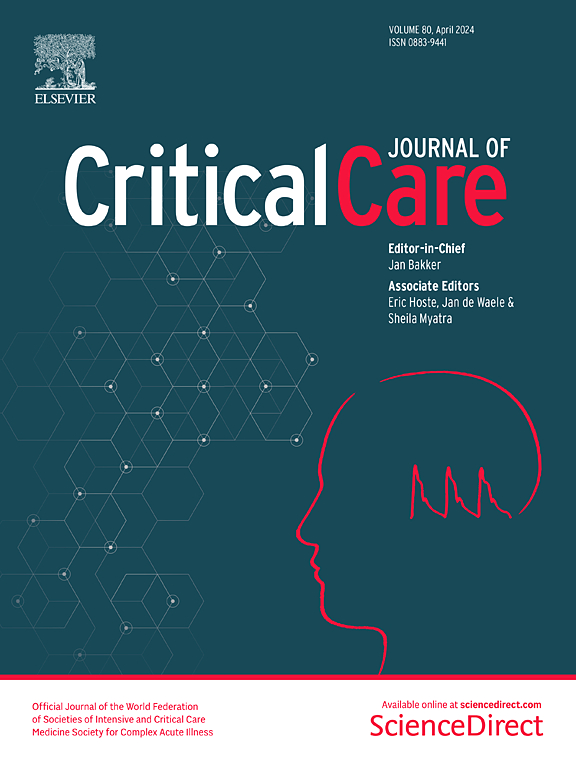自信是重症监护室幸存者执行功能与抑郁之间关系的中介:潜变量分析
IF 8.8
1区 医学
Q1 CRITICAL CARE MEDICINE
引用次数: 0
摘要
执行功能障碍和抑郁症在重症监护室幸存者中很常见,但人们对这两个因素之间的关联机制仍然知之甚少。自信心被认为是认知障碍与心理健康结果之间关系的关键中介因素。本研究旨在探讨自信心在 ICU 幸存者执行功能与抑郁之间关系中的中介作用。在一项横断面研究中,研究人员使用了一份临时调查问卷,对瑞典一所大学医院的三个重症监护室中的一个重症监护室中至少住院72小时的395名成年重症监护室幸存者在出院后6个月至3年的生活质量进行了评估。研究分析了他们对执行功能、自信心和抑郁等问题的回答。采用结构方程模型和确证因子分析来研究自信心对执行功能和抑郁之间关系的中介作用。模型拟合度采用既定指标进行评估。使用麦克唐纳欧米茄和克朗巴赫阿尔法评估了测量的可靠性。研究发现,抑郁症状与自信心下降(r = 0.80,p < 0.001)和执行功能较差(r = 0.55,p < 0.001)之间存在明显的正相关。此外,自信心下降与执行功能受损之间也存在相关性(r = 0.62,p < 0.001)。年龄与抑郁、自信心和执行功能呈负相关,而男性与较高的自信心呈正相关。中介分析表明,执行功能受损对抑郁症状的影响完全由自信心降低所中介(B = 0.45; 95% CI 0.34-0.59)。将自信心纳入模型后,执行功能对抑郁症的直接影响变得不显著(B = 0.07,P = 0.18),表明完全中介。整体模型拟合效果令人满意(CFI = 0.962;RMSEA = 0.075),凸显了中介途径的稳健性。自信心在 ICU 幸存者的执行功能和抑郁之间起着中介作用。旨在增强自信心的干预措施可减轻ICU幸存者人群的抑郁症状。需要进行纵向研究来证实这些发现,并进一步探索其中的因果关系。试验注册 ClinicalTrials.gov Ref# NCT02767180;2016年4月28日注册。本文章由计算机程序翻译,如有差异,请以英文原文为准。
Self-confidence as a mediator in the relationship between executive functioning and depression among ICU survivors: a latent variable analysis
Executive dysfunction and depression are common among ICU survivors, yet the mechanisms linking these two factors remain poorly understood. Self-confidence has been implicated as a key mediator in the relationship between cognitive impairments and mental health outcomes. This study aimed to explore the mediating role of self-confidence in the association between executive functioning and depression in ICU survivors. A provisional questionnaire was used in a cross-sectional study to assess quality of life in 395 adult ICU survivors, each with a minimum 72-h stay at one of three ICUs at a Swedish university hospital, six months to three years post-discharge. Responses to questions on executive function, self-confidence, and depression were analysed. Structural equation modelling and confirmatory factor analysis were employed to examine the mediating effect of self-confidence on the relationship between executive function and depression. Model fit was evaluated using established indicators. Reliability of the measures was assessed using McDonald’s Omega and Cronbach’s Alpha. A significant positive correlation was found between depressive symptoms and both diminished self-confidence (r = 0.80, p < 0.001) and poorer executive function (r = 0.55, p < 0.001). Additionally, a correlation was observed between reduced self-confidence and compromised executive function (r = 0.62, p < 0.001). Age was negatively associated with depression, self-confidence, and executive function, while male gender was positively correlated with higher self-confidence. Mediation analysis revealed that the effect of impaired executive function on depressive symptoms was fully mediated by diminished self-confidence (B = 0.45; 95% CI 0.34–0.59). The direct effect of executive function on depression became non-significant when self-confidence was included in the model (B = 0.07, p = 0.18), suggesting complete mediation. The overall model fit was satisfactory (CFI = 0.962; RMSEA = 0.075), highlighting the robustness of the mediation pathway. Self-confidence mediates the relationship between executive function and depression among ICU survivors. Interventions aimed at enhancing self-confidence could mitigate depressive symptoms in the ICU survivor population. Longitudinal studies are needed to confirm these findings and further explore the causal pathways involved. Trial registration ClinicalTrials.gov Ref# NCT02767180; Registered 28 April 2016.
求助全文
通过发布文献求助,成功后即可免费获取论文全文。
去求助
来源期刊

Critical Care
医学-危重病医学
CiteScore
20.60
自引率
3.30%
发文量
348
审稿时长
1.5 months
期刊介绍:
Critical Care is an esteemed international medical journal that undergoes a rigorous peer-review process to maintain its high quality standards. Its primary objective is to enhance the healthcare services offered to critically ill patients. To achieve this, the journal focuses on gathering, exchanging, disseminating, and endorsing evidence-based information that is highly relevant to intensivists. By doing so, Critical Care seeks to provide a thorough and inclusive examination of the intensive care field.
 求助内容:
求助内容: 应助结果提醒方式:
应助结果提醒方式:


